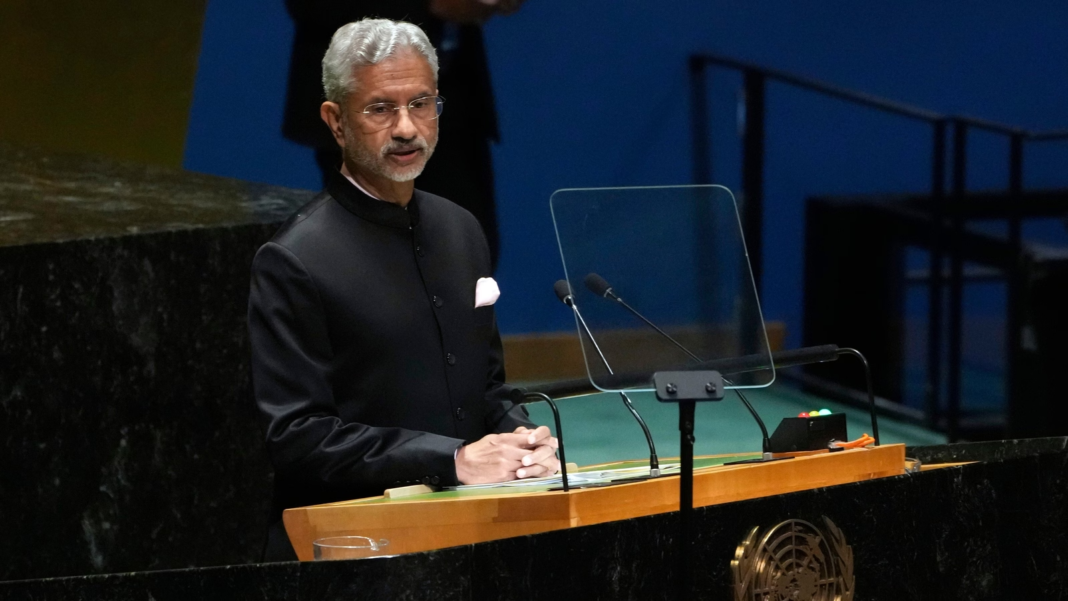United Nations, New York – In a powerful address to the 79th session of the United Nations General Assembly (UNGA), India’s representative emphasized the need for multilateral reforms, global inclusivity, and accountability in tackling current global crises. The speech echoed India’s commitment to ensuring that no country or people are left behind, aligning closely with this year’s theme of the UNGA, “Leaving no one behind.”
The speech commenced with warm congratulations to the President of the General Assembly, H.E. Mr. Philemon Yang, acknowledging the significance of the UNGA theme, and underscoring India’s strong support for collective global progress. However, the address also highlighted the precarious state of the world, still grappling with the aftermath of the COVID-19 pandemic, ongoing conflicts such as the Ukraine war, and the escalating situation in Gaza. Against this backdrop, India urged global leaders to rethink multilateral systems to meet contemporary challenges.
A Fractured World in Need of Unity
India’s representative stressed that the world currently stands polarized, fractured, and riddled with multiple crises, ranging from geopolitical conflicts to economic inequities, climate change, and food insecurity. “The world stands fractious, polarized, and frustrated. Conversations have become difficult; agreements even more so,” the speech noted, lamenting the erosion of trust between nations and the breakdown of global processes.
The address noted that development in the Global South has been severely derailed, with Sustainable Development Goals (SDGs) slipping further out of reach. The pandemic, coupled with unfair trade practices, unsustainable debt, and unviable projects, has left developing countries in a vulnerable state. At the same time, technological advancements, once viewed as engines of progress, have become a source of anxiety, while climate events grow more frequent and intense.
India’s representative emphasized that the world’s founders, who met near Dumbarton Oaks 80 years ago to form the UN, envisioned a global body that could ensure peace and prosperity. Today, both goals appear endangered. The speech candidly stated that “trust has eroded, and processes have broken down,” and urged the world to acknowledge that multilateral systems have been enfeebled due to the self-interest of powerful nations extracting more from the system than they contribute.
Call for Multilateral Reforms
Reforming multilateralism, especially within the United Nations, emerged as one of the key themes of India’s address. The UN, India argued, is increasingly paralyzed by division, conflict, terrorism, and violence, and has failed to address pressing global issues such as food, fuel, and fertilizer security. Additionally, the evasion of climate responsibilities by developed countries is worsening the situation for the developing world, and the consequences of these actions are imperiling human dignity itself.
The call for reform is both urgent and necessary, as the UN is failing to meet the demands of an evolving world. “Leaving no one behind means advancing peace, ensuring sustainable development, and strengthening human dignity,” the representative emphasized. “This cannot be delivered by a UN paralyzed when faced with division, conflict, terrorism, and violence.”
India called for a reassessment of how global systems function and for the creation of mechanisms that better respond to crises. Pointing to structural shortcomings, political calculations, and disregard for vulnerable nations, the speech highlighted how the international community has allowed political self-interest to shape global systems, often leaving weaker nations behind.
India’s Response to Global Challenges
India’s representative laid out how the country has been responding to these global challenges, especially by focusing on the needs of vulnerable populations such as women, farmers, and youth. Through targeted policies and initiatives, India is working to provide its citizens with assured access to piped water, electricity, cooking gas, and new homes. The country has made significant strides in closing gender gaps in health, education, and the workplace, and continues to provide financial support directly to farmers.
Programs such as the Mudra loan initiative, which has provided 495 million loans to small businesses, and the Svanidhi scheme, which has extended millions of loans to street vendors, were highlighted as successful models of social and economic empowerment, particularly for women. India’s focus on skilling its youth and promoting employment and entrepreneurship were also key points in the address.
India also underscored its commitment to sharing its successes with the world, particularly through replicable models such as its digital public infrastructure and health initiatives. The representative noted that “a digital public infrastructure and a people’s pharmacy are today examples of what India can readily offer to the world,” suggesting that these could serve as alternatives to a technology-driven vision that seeks to dominate rather than empower.
Support for the Global South and the Global Commons
India’s address reflected its strong commitment to amplifying the voices of the Global South. The country has convened three Global South Summits, the most recent of which took place in August 2024. These platforms allow for the sharing of concerns and collaboration on common challenges faced by developing nations. India’s contributions to global projects in 78 countries, its response to humanitarian assistance and disaster relief (HADR) situations, and its commitment to ensuring maritime safety and security were also noted as part of India’s efforts to support global commons and those in distress.
Addressing Pakistan’s Terrorism and Radicalization
In a firm rebuke, India’s representative directly addressed Pakistan’s role in cross-border terrorism and regional instability. Referring to Pakistan as a nation that “exports terrorism,” India made it clear that it will not tolerate Pakistan’s cross-border terrorism policies and reiterated its stance that any disputes between the two countries must center on the vacation of illegally occupied Indian territory.
India warned that actions of terrorism will have consequences and stressed that Pakistan’s “GDP can only be measured in terms of radicalization and its exports in the form of terrorism.” The address conveyed a strong message that Pakistan must abandon its long-standing attachment to terrorism if it is to see any normalization of relations.
A Call for a More Inclusive and Effective UN
Concluding the address, India reiterated its belief that the global order must be inclusive and representative, and that the United Nations must evolve in order to meet modern challenges. “Large parts of the world cannot be left behind when it comes to deciding the key issues of our times,” the representative stated, calling for a UN that is “fit for purpose” and that actively seeks common ground rather than perpetuating divisions.
India’s address was ultimately a call to action for the international community. It emphasized that the only way to ensure peace, prosperity, and development for all is through cooperation, inclusivity, and genuine reform of multilateral systems. With these actions, India believes the world can tackle its most pressing problems and create a future where fewer people are left behind.





